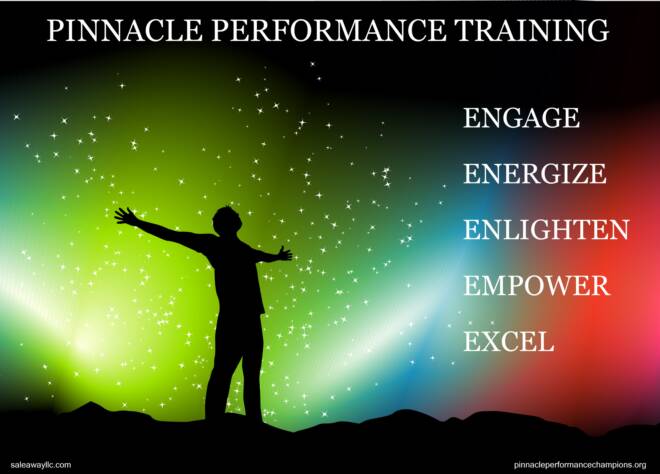Are You The Smartest Sales Person In The Room?
There’s this popular quote, “If you’re the smartest person in the room you’re in the wrong room”. This quote has always struck a nerve with me. More on that shortly. First, a brief (remarkably relevant) story..
About a year or so ago, I was speaking with a business owner who had just decided to hire me to train his sales and service team. His primary reason for hiring me had nothing really to do with anything I had done or said personally, we had never met in person and had only spoken on the phone once. Instead, his reason for hiring me was something another client had said about me to him. “He said you’re crazy smart and had a really positive impact on his whole team”. “Crazy smart”, those were his exact words. Sounds like an oxymoron to me and, besides, being a New Englander with Bostonian DNA, I prefer Wicked Smaaht.
At that time, I didn’t say much of anything other than “great” or similar as we proceeded to formalize our training plans. But that label.. it stuck with me. I knew where it came from but why? In my 12+ years as a trainer, I certainly don’t recall ever referring to myself as “Crazy Smart”.
So please allow me to set the record straight..
I am far from smart, crazy or otherwise, on most things. So are you and all the people you know. Take carpentry for instance. I have a good friend who’s a fantastic carpenter. The kind of guy that didn’t have an addition built on his house so he could do it. And now it looks at least as good as the house! By comparison, my smarts on carpentry are right around dummy level. If I built an addition on your house it would, at best, be an abomination.
Same goes for chemistry and agricultural. I’m not the best choice to mix your meds or tend to your crops. In fact, there’s a very long list of things that I really have no business in. And that’s the whole point.
Everybody is a Genius. But If You Judge a Fish by Its Ability to Climb a Tree, It Will Live Its Whole Life Believing that It is Stupid. – Albert Einstein
Being an expert at carpentry, chemistry or agricultural would do absolutely nothing to further my chosen profession as a sales/customer service/leadership trainer. Accordingly, I spend exactly no time on furthering my rather limited education on these subjects.
On the other hand, if you want to know about sales, customer service and/or leadership well now we’re talking! Business, customer engagement, human relations, creating a winning corporate culture? I’ll ace that test! After all, I’m a trainer/speaker/consultant on those subjects.
Be The Smartest Person In The Room?
Back to the quote; “If you’re the smartest person in the room you’re in the wrong room”.
What’s wrong with being the smartest person in any room? If you’re the dumbest person in the room, are you now in the right room? Actually, that thought is more aligned with the true meaning of the quote. If you’re the smartest person in the room, then you’re prohibiting your growth as you can’t learn anything (that you don’t already know) to further your development. That makes sense.
As an example, if you’re the President of the United States, it would not be most advantageous, and potentially dangerous, to be the smartest person in the room. Accordingly, the President has a Cabinet with the Vice President and the heads of 15 executive departments including Agriculture, Commerce, Defense, Education, Energy, Health and Human Services, and Homeland Security, to name a few. The Cabinet’s role is to advise the President on any subject he may require relating to the duties of each member’s respective office. With that vital appointment, Cabinet members should certainly be the ‘smartest person in the room’ as they are relied upon as the President’s go-to source for expertise in their department. With the health of the country at stake, it makes perfect sense that the ‘smartest’ people are appointed to the President’s cabinet.
The same goes for corporations. Successful CEO’s recognize they can’t do it all and need to hire and surround themselves with the best and brightest people in each department to effectively grow the business. Conversely, many small businesses fail when the CEO takes on too much themselves and/or fails to hire the best people.
However, imagine being sick and not having the smartest doctor in the room treating you? Or a lawyer who’s not sure what to do about your legal matter until he speaks with a smarter attorney than himself. In both cases, you would want to deal with that smartest person directly. Be that smartest person.
Napoleon’s “Specialized Knowledge”
Successful people, in all callings, never stop acquiring specialized knowledge related to their major purpose, business, or profession. — Napoleon Hill
I wholeheartedly agree with the Napoleon Hill’s principle of “Specialized Knowledge”. Napoleon asserted that knowledge is not power, it is only potential power. It only becomes power when, and if, it is organized into a definite plan of action, and directed towards a purpose.
In simple terms, if you want to succeed at anything than you don’t need to know everything. Only what is necessary to succeed at your “major purpose” truly matters.
As I wrote in The Truth about “Born Salesman”, top performers don’t rely on fate/destiny, they decide and commit to being a student of their profession, learning all they can and working to master their craft over time.
So I absolutely agree and totally disagree with the quote, depending on the position it’s based on. If you’re a sales and service professional seeking peak performance (and all the rewards that comes with), you should certainly strive to be ‘the smartest person in the room’, not only an expert in your business/industry/products but also a master at your craft (selling and customer service).
Steve













